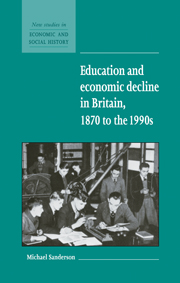Book contents
- Frontmatter
- Contents
- Acknowledgements
- Glossary and abbreviations
- Introduction
- 1 Literacy and schooling, 1870–1914
- 2 Was technical education to blame?
- 3 The counterarguments
- 4 The education of the élite, 1870–1914
- 5 Missed opportunities, 1914–1944
- 6 Post-war decline – the betrayed teenager?
- 7 Higher education and the public schools – privilege and relevance
- Conclusion
- Bibliography
- Index
- New Studies in Economic and Social History
- Studies in Economic and Social History
- Economic History Society
2 - Was technical education to blame?
Published online by Cambridge University Press: 05 June 2012
- Frontmatter
- Contents
- Acknowledgements
- Glossary and abbreviations
- Introduction
- 1 Literacy and schooling, 1870–1914
- 2 Was technical education to blame?
- 3 The counterarguments
- 4 The education of the élite, 1870–1914
- 5 Missed opportunities, 1914–1944
- 6 Post-war decline – the betrayed teenager?
- 7 Higher education and the public schools – privilege and relevance
- Conclusion
- Bibliography
- Index
- New Studies in Economic and Social History
- Studies in Economic and Social History
- Economic History Society
Summary
A great deal of controversy has been associated with the question of defects of scientific and technical education and their culpability for Britain's supposed poor economic performance before 1914. This chapter will consider the arguments of those who hold this view.
This was certainly the opinion held by many contemporaries and it arose primarily from a cluster of events around 1870. In 1867 British industrialists displayed their wares at the International Exposition in Paris and won only ten of the ninety classes. This was in contrast to the Great Exhibition in 1851 when British manufacturers won most of the prizes. A commentator noted ‘by that Exhibition we were rudely awakened and thoroughly alarmed … we were beaten on nearly all those points on which we have prided ourselves’ (Ahlstrom, 1982 citing J. Scott Russel). The Royal Society of Arts sent artisans to Paris to report and they too observed ‘the general deficiency of the technical knowledge of our best workmen’ (Sanderson, 1996). Subsequent Paris expositions in 1878, 1889, 1900 drove the message home. In the next year, 1868, Matthew Arnold's report on Prussian education drew our attention to the superiority of that country which had a systematised education providing universal literacy, scientific instruction and a military strength that underlay its nation building by war. The Paris Exhibition of 1867 led to a long sequence of investigations into science, industry and technical education by Bernhard Samuelson in 1868, the Duke of Devonshire 1870–5, Samuelson again in 1884 and the Royal Commission on the Great Depression in 1886.
- Type
- Chapter
- Information
- Publisher: Cambridge University PressPrint publication year: 1999



